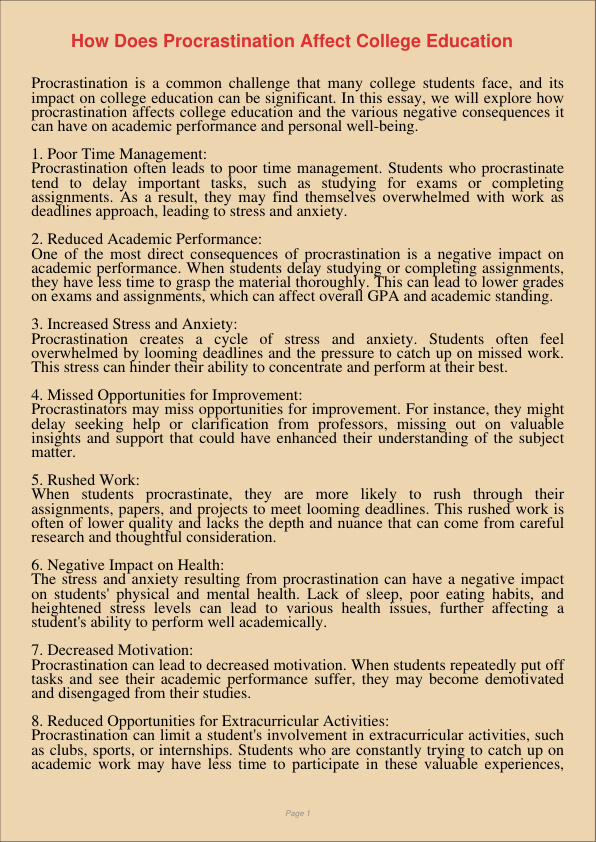
Procrastination is a common challenge that many college students face, and its impact on college education can be significant. In this essay, we will explore how procrastination affects college education and the various negative consequences it can have on academic performance and personal well-being.
-
Poor Time Management: Procrastination often leads to poor time management. Students who procrastinate tend to delay important tasks, such as studying for exams or completing assignments. As a result, they may find themselves overwhelmed with work as deadlines approach, leading to stress and anxiety.
-
Reduced Academic Performance: One of the most direct consequences of procrastination is a negative impact on academic performance. When students delay studying or completing assignments, they have less time to grasp the material thoroughly. This can lead to lower grades on exams and assignments, which can affect overall GPA and academic standing.
-
Increased Stress and Anxiety: Procrastination creates a cycle of stress and anxiety. Students often feel overwhelmed by looming deadlines and the pressure to catch up on missed work. This stress can hinder their ability to concentrate and perform at their best.
-
Missed Opportunities for Improvement: Procrastinators may miss opportunities for improvement. For instance, they might delay seeking help or clarification from professors, missing out on valuable insights and support that could have enhanced their understanding of the subject matter.
-
Rushed Work: When students procrastinate, they are more likely to rush through their assignments, papers, and projects to meet looming deadlines. This rushed work is often of lower quality and lacks the depth and nuance that can come from careful research and thoughtful consideration.
-
Negative Impact on Health: The stress and anxiety resulting from procrastination can have a negative impact on students’ physical and mental health. Lack of sleep, poor eating habits, and heightened stress levels can lead to various health issues, further affecting a student’s ability to perform well academically.
-
Decreased Motivation: Procrastination can lead to decreased motivation. When students repeatedly put off tasks and see their academic performance suffer, they may become demotivated and disengaged from their studies.
-
Reduced Opportunities for Extracurricular Activities: Procrastination can limit a student’s involvement in extracurricular activities, such as clubs, sports, or internships. Students who are constantly trying to catch up on academic work may have less time to participate in these valuable experiences, which can provide personal and professional development opportunities.
-
Long-Term Consequences: Procrastination can have long-term consequences for a student’s education. Poor grades, missed opportunities, and decreased motivation can affect a student’s overall academic and career trajectory.
-
Delayed Graduation: For some students, chronic procrastination can lead to delayed graduation. If they fail to complete required courses or accumulate enough credits within the expected timeframe, they may need to stay in college longer, incurring additional costs and potentially delaying their entry into the workforce.
In conclusion, procrastination is a significant issue that affects college education in multiple ways. It undermines academic performance, increases stress and anxiety, limits personal development opportunities, and can lead to long-term consequences. Recognizing the harmful effects of procrastination and developing effective time management and study habits is essential for students to succeed in their college education and beyond.
「真诚赞赏,手留余香」
真诚赞赏,手留余香
使用微信扫描二维码完成支付
